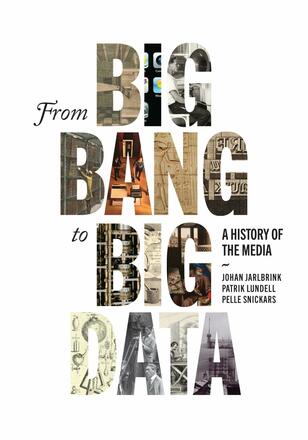
From Big Bang to Big Data
A History of the Media
A long history of media – from antique graffiti to Spotify playlists.
La description
Does media history really start with a bang? More than just newspapers, television, and social networks, media are the means by which any information is communicated, from cosmic radiation traces to medieval church bells to modern identity documents. Cultures are held together as much by bookkeeping and records as they are by stories and myths.
From Big Bang to Big Data is a long history of the media – how it has been established, used, and transformed from the beginning of recorded time until the present. It is not primarily a story of revolutions and innovations, but of continuities and overlaps that reveal surprising patterns across history. Many media were invented as ways to store and share information, and many have served as powerful tools for administration and control. The concerns raised about media today, whether about privacy, piracy, or anxieties over declining cultural standards, preoccupied earlier generations too. In a playful style, accompanied by more than one hundred illustrations, the authors show us how every society has been a media society in its own way.
From antique graffiti to last year’s viral YouTube clip, the past is only approachable through media. From Big Bang to Big Data provides a new way of thinking about media in history – and about human societies past and present.
Reviews
“The big-history approach to media we’ve been missing. Cosmopolitan in intellectual outlook and integrated in argument, From Big Bang to Big Data moves along briskly. Any curious reader will enjoy this book, while the clued-in scholarly reader will spot sentences and paragraphs that index whole traditions of complex argument.” John Durham Peters, co-author of Promiscuous Knowledge: Information, Image, and Other Truth Games in History
“This book is big, not just in size but in scope. How else might one characterize a book that opens with the beginning of time and then impressively winds its way through Arabia, China, and medieval Europe to finish with a chapter on digital media and big data? ... the book’s focus is somewhat unique to media history texts in that it focuses not on chronology but on implications, i.e., the transformations that have shaped society and people's acquisition of meaning from whatever platform a media producer chooses. The book makes readers think and is also richly illustrated to help guide such thoughts. Media theorist Neil Postman once said that 'for every advantage a new technology offers, there is always a corresponding disadvantage.' This book reinforces that theory. Highly recommended." Choice
"[From Big Bang to Big Data] bucks traditions of academic publishing. It is a narrative, visual, and accessible read. The hardback is beautiful, bringing university-contained concepts into flowing sections accompanied by summaries of key thinkers and their concepts. Jarlbrink, Lundell, and Snickars’s meticulous narrative crafting, thoughtful inclusion of visuals, and occasional interesting anecdote make it both an informative and enjoyable read." H-Sci-Med-Tech